WIE3004 Assignment: In-Depth Analysis of Google Search Engine
VerifiedAdded on 2023/06/13
|6
|1580
|238
Report
AI Summary
This report provides a detailed analysis of the Google search engine, addressing its functionality, database creation via web crawlers, and ranking algorithms. It explores the types of searches supported, including keyword-based searches and Boolean syntax, while also examining tips for effective searching and document retrieval. The report further investigates special features unique to Google and evaluates the search engine's performance, scalability, effectiveness, and efficiency based on personal experience. The analysis concludes with a rating of Google's search engine and includes references to support the information presented.
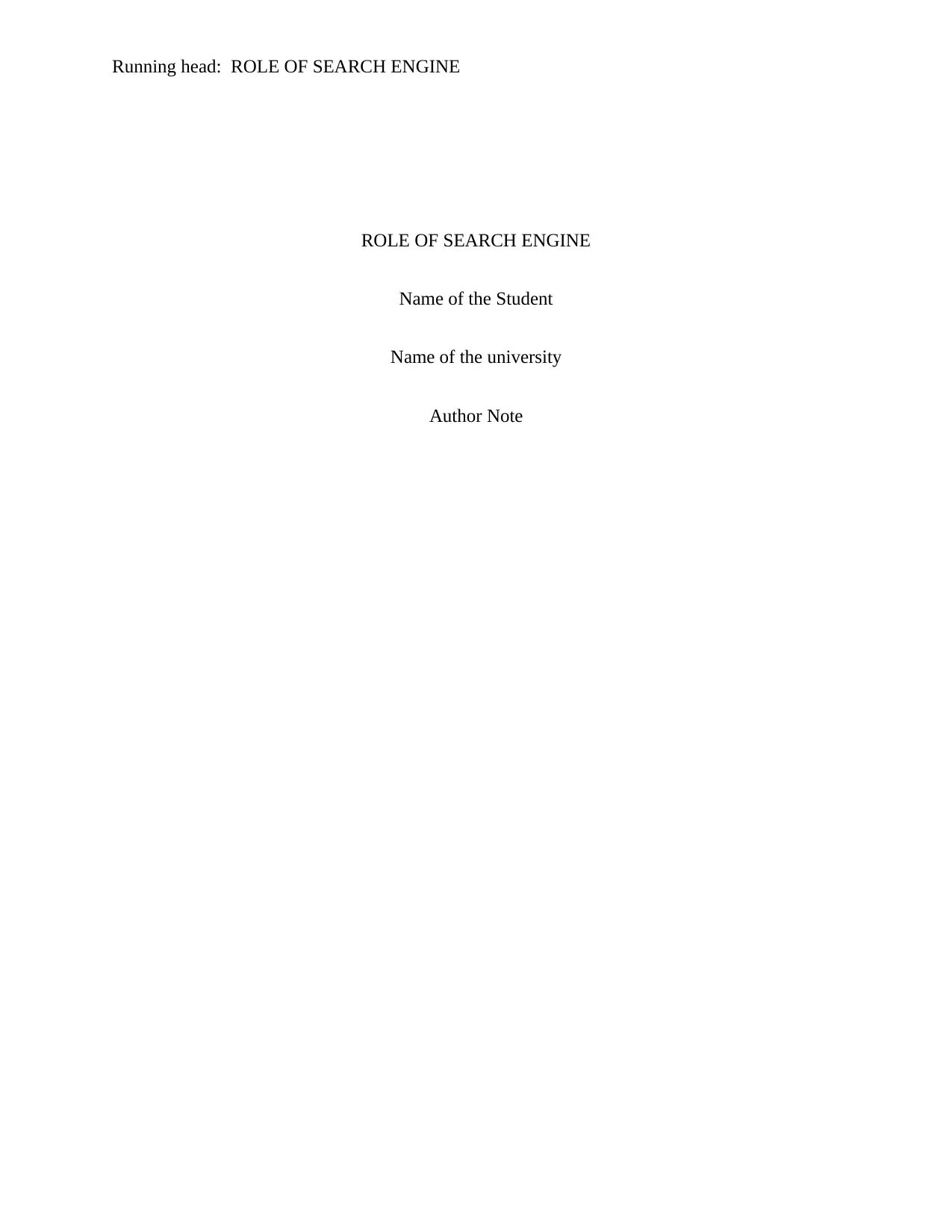
Running head: ROLE OF SEARCH ENGINE
ROLE OF SEARCH ENGINE
Name of the Student
Name of the university
Author Note
ROLE OF SEARCH ENGINE
Name of the Student
Name of the university
Author Note
Paraphrase This Document
Need a fresh take? Get an instant paraphrase of this document with our AI Paraphraser
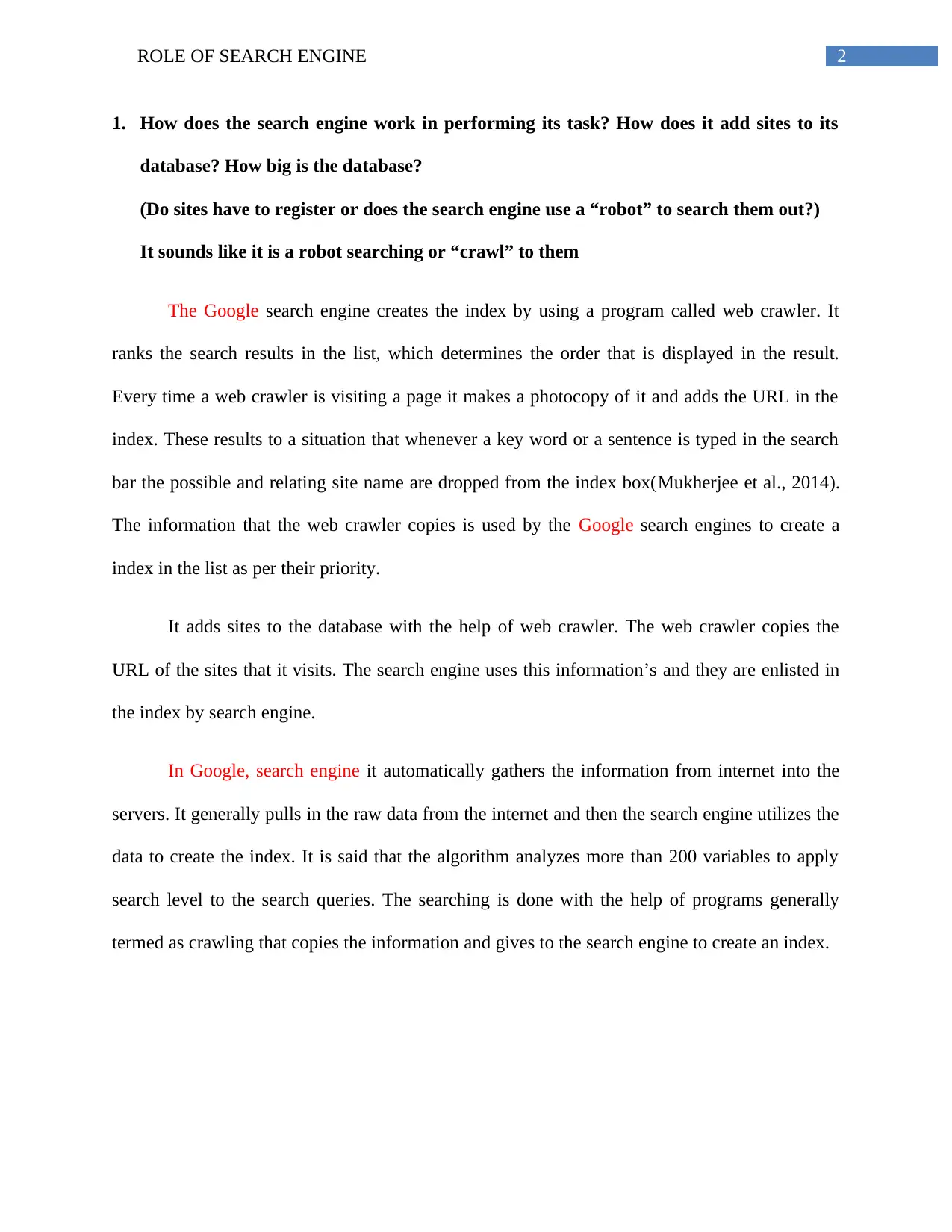
2ROLE OF SEARCH ENGINE
1. How does the search engine work in performing its task? How does it add sites to its
database? How big is the database?
(Do sites have to register or does the search engine use a “robot” to search them out?)
It sounds like it is a robot searching or “crawl” to them
The Google search engine creates the index by using a program called web crawler. It
ranks the search results in the list, which determines the order that is displayed in the result.
Every time a web crawler is visiting a page it makes a photocopy of it and adds the URL in the
index. These results to a situation that whenever a key word or a sentence is typed in the search
bar the possible and relating site name are dropped from the index box(Mukherjee et al., 2014).
The information that the web crawler copies is used by the Google search engines to create a
index in the list as per their priority.
It adds sites to the database with the help of web crawler. The web crawler copies the
URL of the sites that it visits. The search engine uses this information’s and they are enlisted in
the index by search engine.
In Google, search engine it automatically gathers the information from internet into the
servers. It generally pulls in the raw data from the internet and then the search engine utilizes the
data to create the index. It is said that the algorithm analyzes more than 200 variables to apply
search level to the search queries. The searching is done with the help of programs generally
termed as crawling that copies the information and gives to the search engine to create an index.
1. How does the search engine work in performing its task? How does it add sites to its
database? How big is the database?
(Do sites have to register or does the search engine use a “robot” to search them out?)
It sounds like it is a robot searching or “crawl” to them
The Google search engine creates the index by using a program called web crawler. It
ranks the search results in the list, which determines the order that is displayed in the result.
Every time a web crawler is visiting a page it makes a photocopy of it and adds the URL in the
index. These results to a situation that whenever a key word or a sentence is typed in the search
bar the possible and relating site name are dropped from the index box(Mukherjee et al., 2014).
The information that the web crawler copies is used by the Google search engines to create a
index in the list as per their priority.
It adds sites to the database with the help of web crawler. The web crawler copies the
URL of the sites that it visits. The search engine uses this information’s and they are enlisted in
the index by search engine.
In Google, search engine it automatically gathers the information from internet into the
servers. It generally pulls in the raw data from the internet and then the search engine utilizes the
data to create the index. It is said that the algorithm analyzes more than 200 variables to apply
search level to the search queries. The searching is done with the help of programs generally
termed as crawling that copies the information and gives to the search engine to create an index.
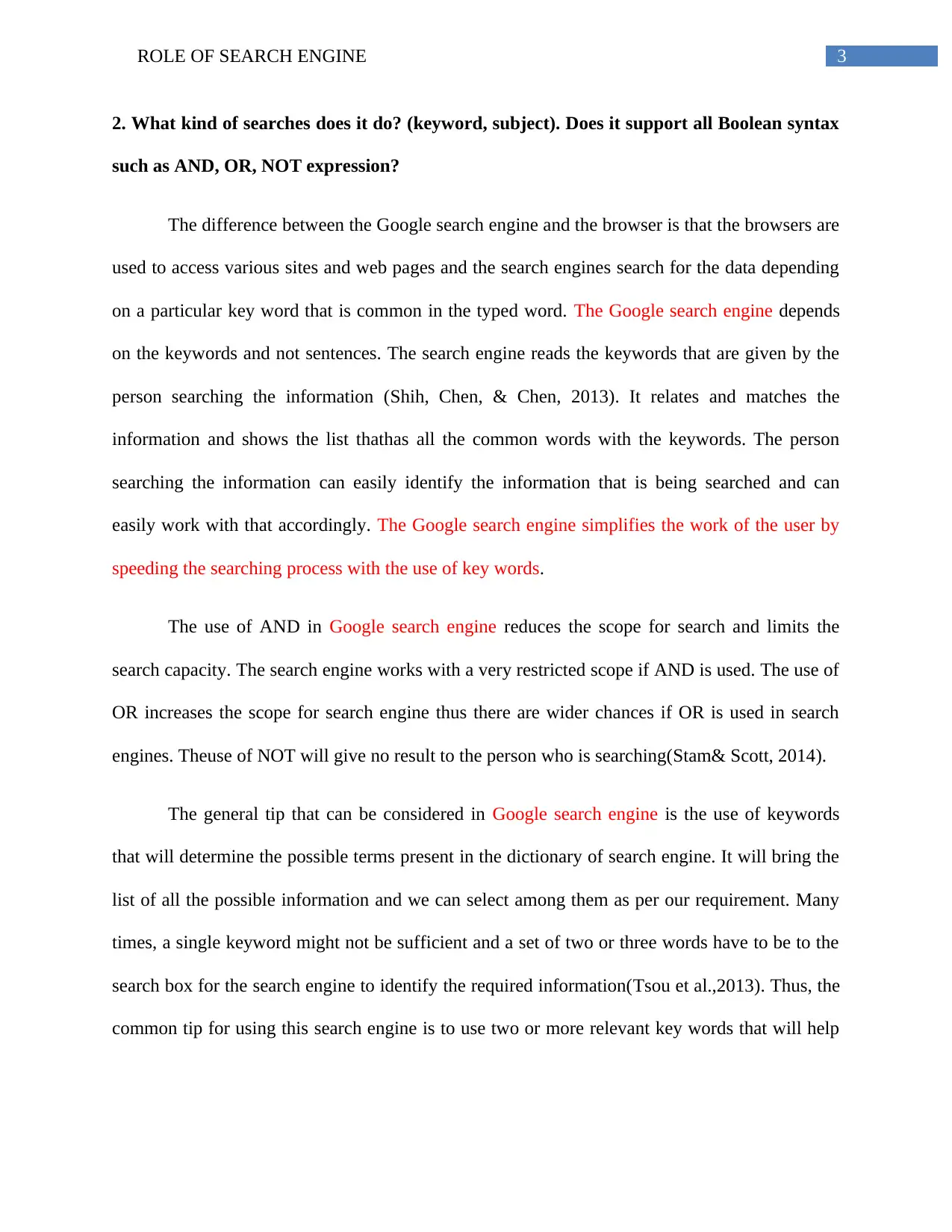
3ROLE OF SEARCH ENGINE
2. What kind of searches does it do? (keyword, subject). Does it support all Boolean syntax
such as AND, OR, NOT expression?
The difference between the Google search engine and the browser is that the browsers are
used to access various sites and web pages and the search engines search for the data depending
on a particular key word that is common in the typed word. The Google search engine depends
on the keywords and not sentences. The search engine reads the keywords that are given by the
person searching the information (Shih, Chen, & Chen, 2013). It relates and matches the
information and shows the list thathas all the common words with the keywords. The person
searching the information can easily identify the information that is being searched and can
easily work with that accordingly. The Google search engine simplifies the work of the user by
speeding the searching process with the use of key words.
The use of AND in Google search engine reduces the scope for search and limits the
search capacity. The search engine works with a very restricted scope if AND is used. The use of
OR increases the scope for search engine thus there are wider chances if OR is used in search
engines. Theuse of NOT will give no result to the person who is searching(Stam& Scott, 2014).
The general tip that can be considered in Google search engine is the use of keywords
that will determine the possible terms present in the dictionary of search engine. It will bring the
list of all the possible information and we can select among them as per our requirement. Many
times, a single keyword might not be sufficient and a set of two or three words have to be to the
search box for the search engine to identify the required information(Tsou et al.,2013). Thus, the
common tip for using this search engine is to use two or more relevant key words that will help
2. What kind of searches does it do? (keyword, subject). Does it support all Boolean syntax
such as AND, OR, NOT expression?
The difference between the Google search engine and the browser is that the browsers are
used to access various sites and web pages and the search engines search for the data depending
on a particular key word that is common in the typed word. The Google search engine depends
on the keywords and not sentences. The search engine reads the keywords that are given by the
person searching the information (Shih, Chen, & Chen, 2013). It relates and matches the
information and shows the list thathas all the common words with the keywords. The person
searching the information can easily identify the information that is being searched and can
easily work with that accordingly. The Google search engine simplifies the work of the user by
speeding the searching process with the use of key words.
The use of AND in Google search engine reduces the scope for search and limits the
search capacity. The search engine works with a very restricted scope if AND is used. The use of
OR increases the scope for search engine thus there are wider chances if OR is used in search
engines. Theuse of NOT will give no result to the person who is searching(Stam& Scott, 2014).
The general tip that can be considered in Google search engine is the use of keywords
that will determine the possible terms present in the dictionary of search engine. It will bring the
list of all the possible information and we can select among them as per our requirement. Many
times, a single keyword might not be sufficient and a set of two or three words have to be to the
search box for the search engine to identify the required information(Tsou et al.,2013). Thus, the
common tip for using this search engine is to use two or more relevant key words that will help
⊘ This is a preview!⊘
Do you want full access?
Subscribe today to unlock all pages.

Trusted by 1+ million students worldwide
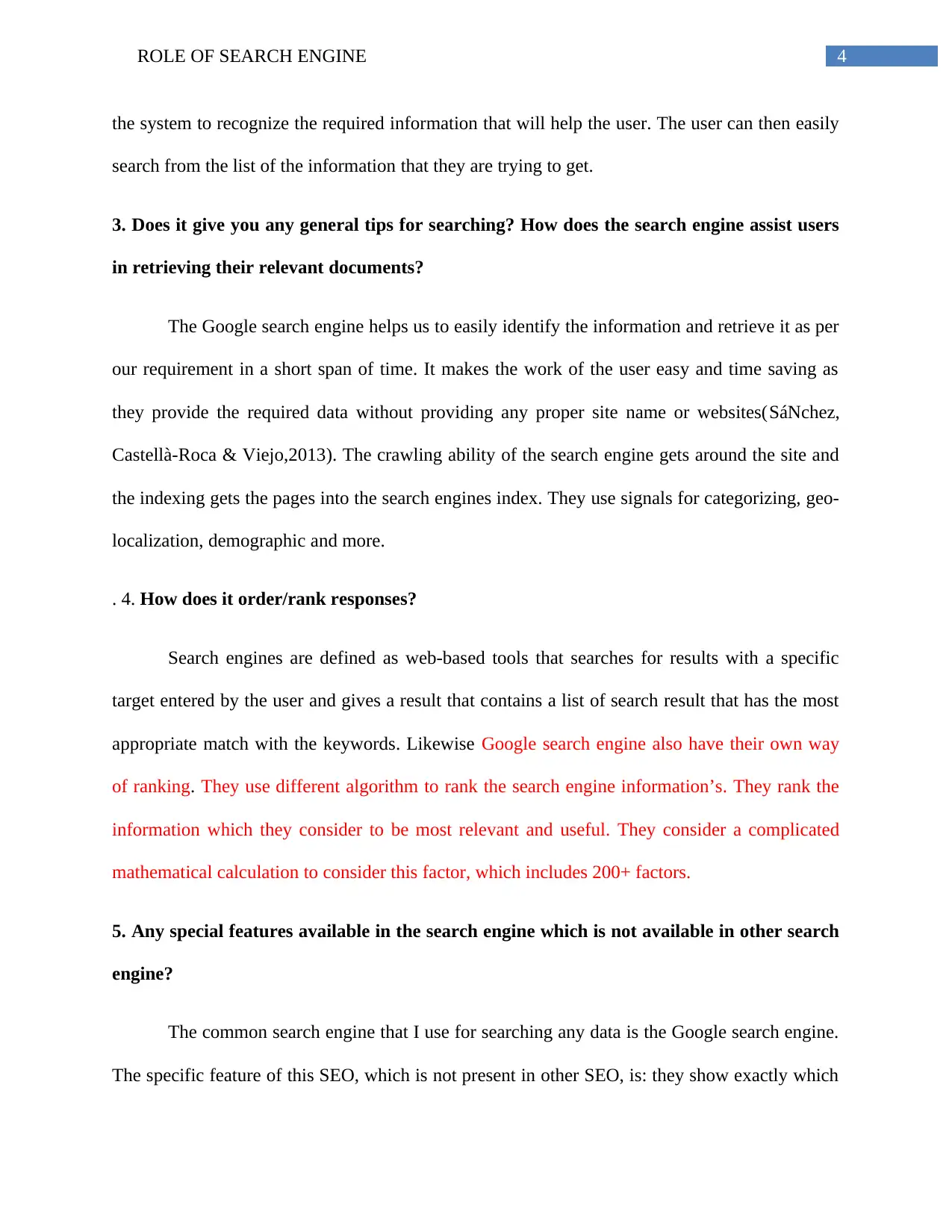
4ROLE OF SEARCH ENGINE
the system to recognize the required information that will help the user. The user can then easily
search from the list of the information that they are trying to get.
3. Does it give you any general tips for searching? How does the search engine assist users
in retrieving their relevant documents?
The Google search engine helps us to easily identify the information and retrieve it as per
our requirement in a short span of time. It makes the work of the user easy and time saving as
they provide the required data without providing any proper site name or websites(SáNchez,
Castellà-Roca & Viejo,2013). The crawling ability of the search engine gets around the site and
the indexing gets the pages into the search engines index. They use signals for categorizing, geo-
localization, demographic and more.
. 4. How does it order/rank responses?
Search engines are defined as web-based tools that searches for results with a specific
target entered by the user and gives a result that contains a list of search result that has the most
appropriate match with the keywords. Likewise Google search engine also have their own way
of ranking. They use different algorithm to rank the search engine information’s. They rank the
information which they consider to be most relevant and useful. They consider a complicated
mathematical calculation to consider this factor, which includes 200+ factors.
5. Any special features available in the search engine which is not available in other search
engine?
The common search engine that I use for searching any data is the Google search engine.
The specific feature of this SEO, which is not present in other SEO, is: they show exactly which
the system to recognize the required information that will help the user. The user can then easily
search from the list of the information that they are trying to get.
3. Does it give you any general tips for searching? How does the search engine assist users
in retrieving their relevant documents?
The Google search engine helps us to easily identify the information and retrieve it as per
our requirement in a short span of time. It makes the work of the user easy and time saving as
they provide the required data without providing any proper site name or websites(SáNchez,
Castellà-Roca & Viejo,2013). The crawling ability of the search engine gets around the site and
the indexing gets the pages into the search engines index. They use signals for categorizing, geo-
localization, demographic and more.
. 4. How does it order/rank responses?
Search engines are defined as web-based tools that searches for results with a specific
target entered by the user and gives a result that contains a list of search result that has the most
appropriate match with the keywords. Likewise Google search engine also have their own way
of ranking. They use different algorithm to rank the search engine information’s. They rank the
information which they consider to be most relevant and useful. They consider a complicated
mathematical calculation to consider this factor, which includes 200+ factors.
5. Any special features available in the search engine which is not available in other search
engine?
The common search engine that I use for searching any data is the Google search engine.
The specific feature of this SEO, which is not present in other SEO, is: they show exactly which
Paraphrase This Document
Need a fresh take? Get an instant paraphrase of this document with our AI Paraphraser
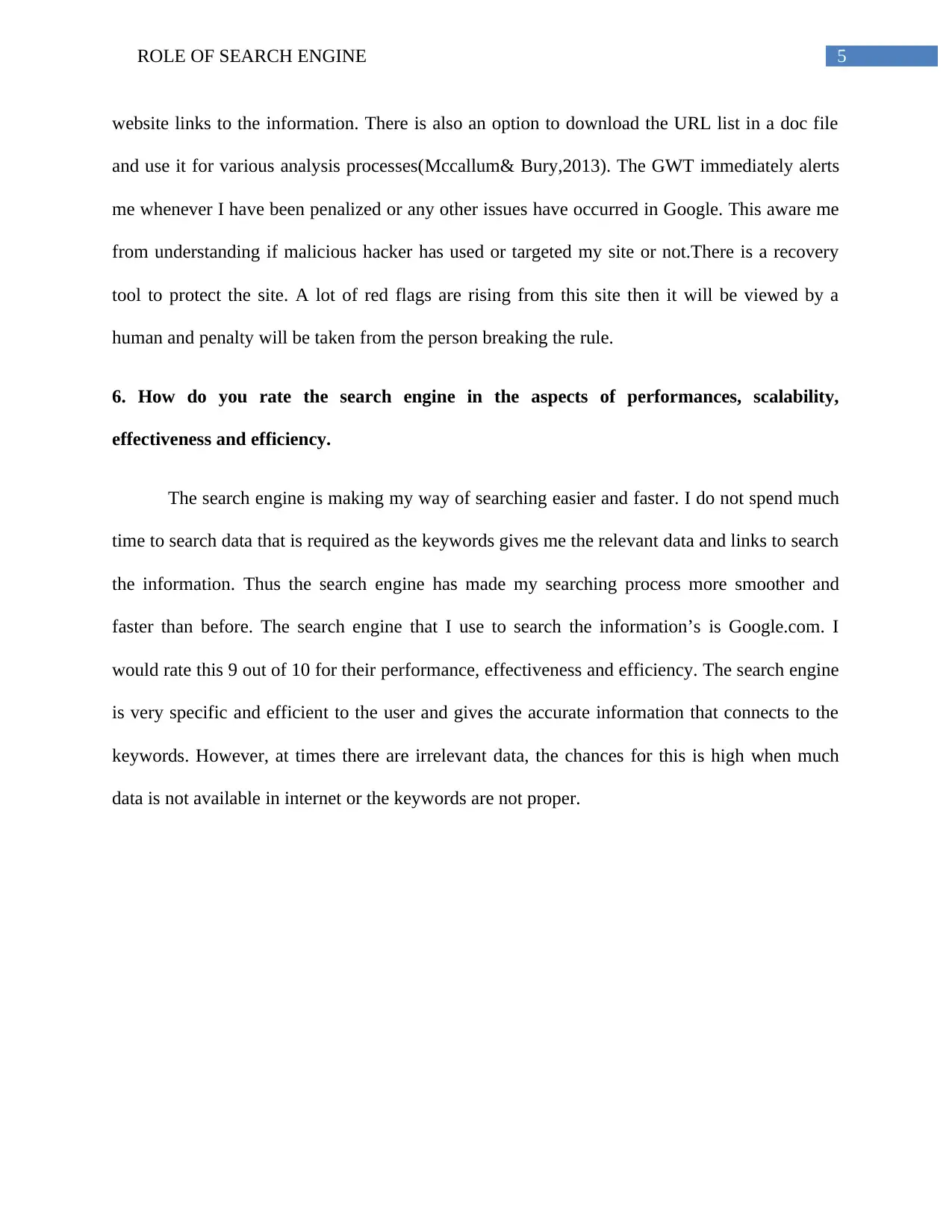
5ROLE OF SEARCH ENGINE
website links to the information. There is also an option to download the URL list in a doc file
and use it for various analysis processes(Mccallum& Bury,2013). The GWT immediately alerts
me whenever I have been penalized or any other issues have occurred in Google. This aware me
from understanding if malicious hacker has used or targeted my site or not.There is a recovery
tool to protect the site. A lot of red flags are rising from this site then it will be viewed by a
human and penalty will be taken from the person breaking the rule.
6. How do you rate the search engine in the aspects of performances, scalability,
effectiveness and efficiency.
The search engine is making my way of searching easier and faster. I do not spend much
time to search data that is required as the keywords gives me the relevant data and links to search
the information. Thus the search engine has made my searching process more smoother and
faster than before. The search engine that I use to search the information’s is Google.com. I
would rate this 9 out of 10 for their performance, effectiveness and efficiency. The search engine
is very specific and efficient to the user and gives the accurate information that connects to the
keywords. However, at times there are irrelevant data, the chances for this is high when much
data is not available in internet or the keywords are not proper.
website links to the information. There is also an option to download the URL list in a doc file
and use it for various analysis processes(Mccallum& Bury,2013). The GWT immediately alerts
me whenever I have been penalized or any other issues have occurred in Google. This aware me
from understanding if malicious hacker has used or targeted my site or not.There is a recovery
tool to protect the site. A lot of red flags are rising from this site then it will be viewed by a
human and penalty will be taken from the person breaking the rule.
6. How do you rate the search engine in the aspects of performances, scalability,
effectiveness and efficiency.
The search engine is making my way of searching easier and faster. I do not spend much
time to search data that is required as the keywords gives me the relevant data and links to search
the information. Thus the search engine has made my searching process more smoother and
faster than before. The search engine that I use to search the information’s is Google.com. I
would rate this 9 out of 10 for their performance, effectiveness and efficiency. The search engine
is very specific and efficient to the user and gives the accurate information that connects to the
keywords. However, at times there are irrelevant data, the chances for this is high when much
data is not available in internet or the keywords are not proper.
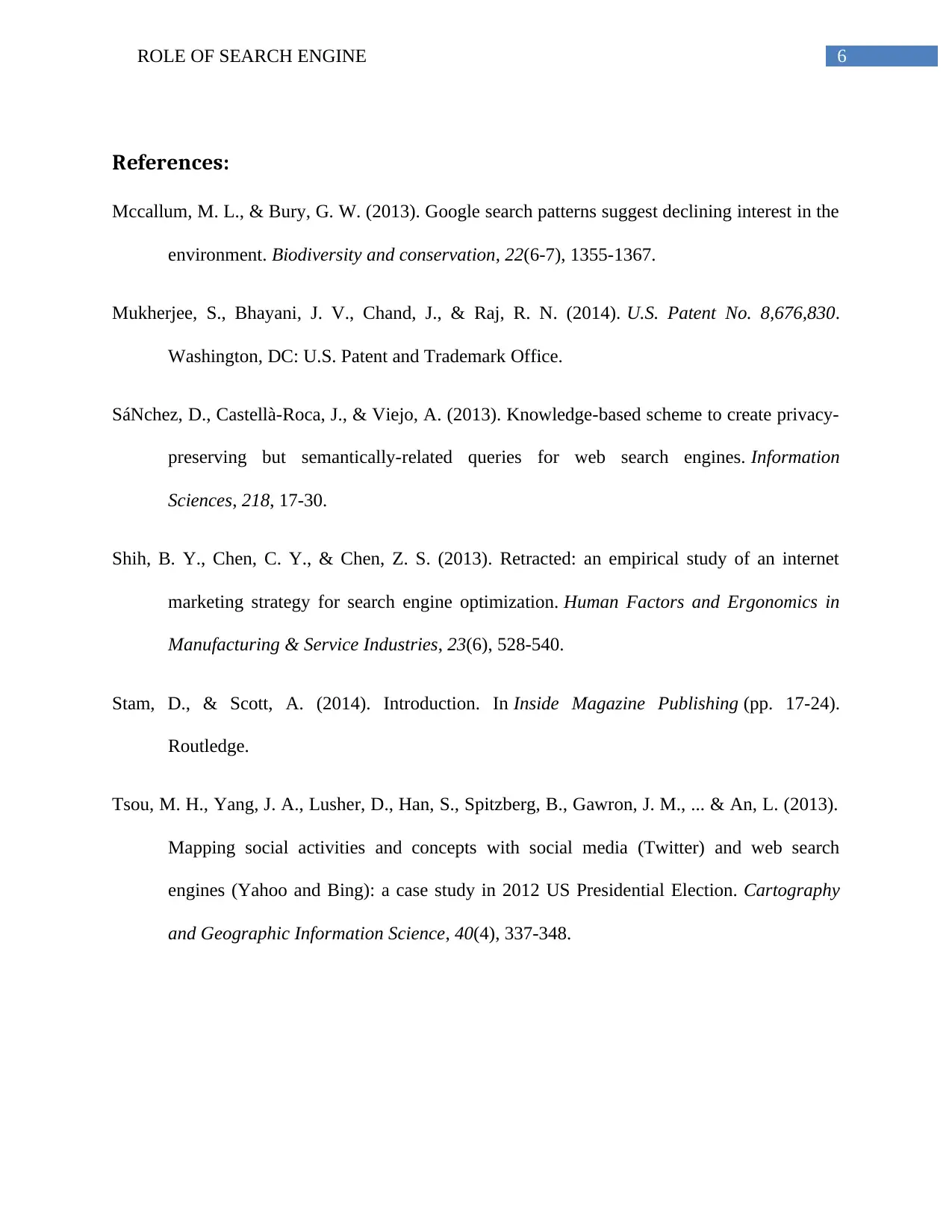
6ROLE OF SEARCH ENGINE
References:
Mccallum, M. L., & Bury, G. W. (2013). Google search patterns suggest declining interest in the
environment. Biodiversity and conservation, 22(6-7), 1355-1367.
Mukherjee, S., Bhayani, J. V., Chand, J., & Raj, R. N. (2014). U.S. Patent No. 8,676,830.
Washington, DC: U.S. Patent and Trademark Office.
SáNchez, D., Castellà-Roca, J., & Viejo, A. (2013). Knowledge-based scheme to create privacy-
preserving but semantically-related queries for web search engines. Information
Sciences, 218, 17-30.
Shih, B. Y., Chen, C. Y., & Chen, Z. S. (2013). Retracted: an empirical study of an internet
marketing strategy for search engine optimization. Human Factors and Ergonomics in
Manufacturing & Service Industries, 23(6), 528-540.
Stam, D., & Scott, A. (2014). Introduction. In Inside Magazine Publishing (pp. 17-24).
Routledge.
Tsou, M. H., Yang, J. A., Lusher, D., Han, S., Spitzberg, B., Gawron, J. M., ... & An, L. (2013).
Mapping social activities and concepts with social media (Twitter) and web search
engines (Yahoo and Bing): a case study in 2012 US Presidential Election. Cartography
and Geographic Information Science, 40(4), 337-348.
References:
Mccallum, M. L., & Bury, G. W. (2013). Google search patterns suggest declining interest in the
environment. Biodiversity and conservation, 22(6-7), 1355-1367.
Mukherjee, S., Bhayani, J. V., Chand, J., & Raj, R. N. (2014). U.S. Patent No. 8,676,830.
Washington, DC: U.S. Patent and Trademark Office.
SáNchez, D., Castellà-Roca, J., & Viejo, A. (2013). Knowledge-based scheme to create privacy-
preserving but semantically-related queries for web search engines. Information
Sciences, 218, 17-30.
Shih, B. Y., Chen, C. Y., & Chen, Z. S. (2013). Retracted: an empirical study of an internet
marketing strategy for search engine optimization. Human Factors and Ergonomics in
Manufacturing & Service Industries, 23(6), 528-540.
Stam, D., & Scott, A. (2014). Introduction. In Inside Magazine Publishing (pp. 17-24).
Routledge.
Tsou, M. H., Yang, J. A., Lusher, D., Han, S., Spitzberg, B., Gawron, J. M., ... & An, L. (2013).
Mapping social activities and concepts with social media (Twitter) and web search
engines (Yahoo and Bing): a case study in 2012 US Presidential Election. Cartography
and Geographic Information Science, 40(4), 337-348.
⊘ This is a preview!⊘
Do you want full access?
Subscribe today to unlock all pages.

Trusted by 1+ million students worldwide
1 out of 6
Related Documents
Your All-in-One AI-Powered Toolkit for Academic Success.
+13062052269
info@desklib.com
Available 24*7 on WhatsApp / Email
![[object Object]](/_next/static/media/star-bottom.7253800d.svg)
Unlock your academic potential
Copyright © 2020–2026 A2Z Services. All Rights Reserved. Developed and managed by ZUCOL.





